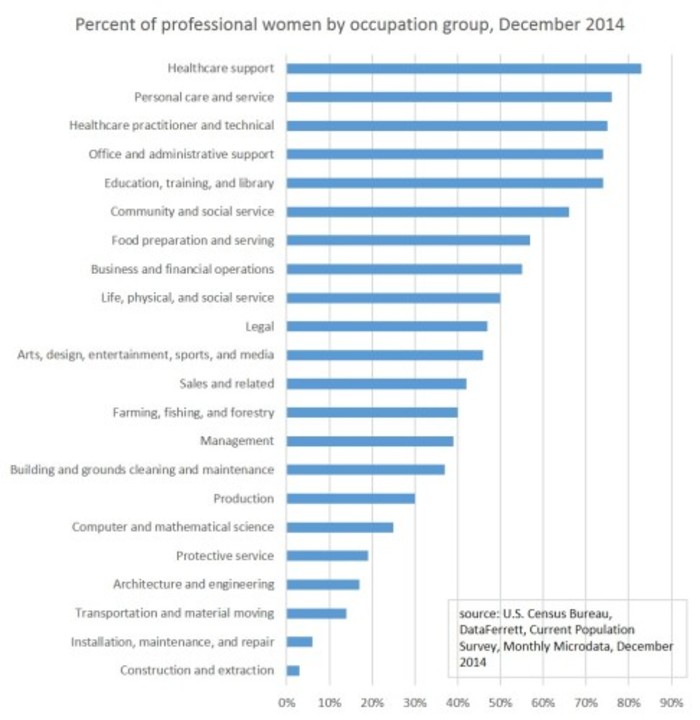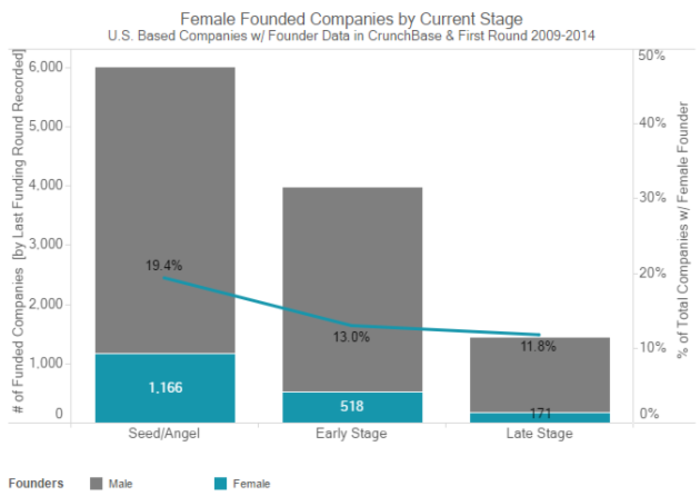'If you haven't faced discrimination as a woman, you haven't worked'
Four female Irish business leaders share their experiences of gender bias.
DESPITE A FEW signs of improvement, sexism remains alive and well in the business world.
While the share of startup founders who are women has nearly doubled since 2009, the total remains a lowly 18% worldwide, according to data from Crunchbase.
Last year, Sukhinder Singh, the founder of e-commerce startup Joyus, attempted to make paint a picture of the bias against women in business through a mass survey of over 200 female founders.
The results show that the overwhelming majority of respondents feel they are judged differently in the workplace due to their gender.
Two-thirds could cite a specific instance of bias and a similar proportion had experienced issues when raising funding rounds for their company.
A wider survey in the US last year highlighted women account for more than half of the workforce but are vastly underrepresented in the science, technology, engineering and maths (STEM) sector.

With those stark figures in mind, Fora asked four successful businesswomen in Ireland for their personal experiences of dealing with gender bias in the workplace:
Women as experts – Margaret E Ward – WomenOnAir founder
“A lot of women don’t consider themselves experts even when they are. Women are hesitant to put themselves forward as being experts … because usually you get a knock back of ‘who do you think you are?’
“During the American election (in 2012) I was asked by a big Irish radio station to go on to discuss the election. I was busy and gave them a list of 14 names and purposely made sure eleven of those names were female and three men.
“They called the men that day and then with a week to go they called me back and said they were desperate for me to come on. I said to them ‘what happened to the list I sent?’ There was a woman on their who was part of the Democratic Party … the producer said they didn’t think she would be ‘analytical enough’.
“Consider there’s a job going and there are ten areas of expertise required. Studies show a man will apply if he has two out of the ten they’re asking for, but a woman needs nine or ten out of ten before she will put her CV forward. It’s a confidence issue.”
Funding – Sonya Lennon – Frock Advisor Co-founder (that raised over €225,000)
“Asking somebody to part with money and believe in you is one of the hardest things you can do. Investment is a very alpha-male world. I have pitched to mainly men but also to women. I think sometimes the women are harder to convince because they have to try and prove themselves in that arena.
“The VC world tends to be populated by men who tend to look the same, dress the same – the world of the chino and the blue shirt. And it is more normal for them to invest in men than women, so women are going in on the back foot before they even go in.
“Women have to leverage their novelty value and accept that they are going in as a minority. Women have to be stronger because of that and not frightened by it. That said, I also think it is a very tough environment regardless of if you are a woman or a man.”

Overlooked for promotion – Sarah Bourke – Skytek co-founder and winner of 2016 EU Prize for Women Innovators
“If you have someone going for promotion in their thirties – a guy and a girl – every time, I’d say, they will promote the man because they are afraid the woman will go on maternity leave.
“A lot of women are being taken out of the workforce through inflexible arrangements for working mothers. That’s the reality of it. When going for an interview, taking off a wedding ring doesn’t make a blind piece of difference, it’s all to do with age profile. Employers see a woman in her thirties as a woman that’s going to have children.
“The issue isn’t with employers making a choice because they see a woman going on maternity leave, the issue is with the structures that don’t support a woman going away.”
Impostor syndrome – Nicola O’Neill – President of Irish Institute of Training and Development
“From a women’s perspective, there’s the element of the impostor syndrome and women needing to push themselves forward more to be heard.
“Even at conferences, they tend not to put their hand up and ask questions when men do. So I think there is a level of responsibility on women in terms of their ability and confidence level around not fearing this impostor syndrome and that their question is important and opinion deserves to be heard.
“Women need to speak up themselves and need to get over themselves around this impostor syndrome and realise they are good enough.”






